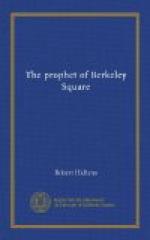As Malkiel pronounced the last words he flung his black overcoat wide open with an ample gesture, thrust one hand into his breast, and assumed the fixed and far-seeing gaze of a man in a cabinet photograph. He seemed lost to his surroundings, and rapt by some great vision of enchanted architects, busy in drawing plans of the magic buildings of the future ages. The Prophet felt that it would be impious to disturb him. Malkiel’s reverie was long, and indeed the two prophets might well have been sitting in Jellybrand’s parlour now, had not a violent sneeze called for the pink assistance of the flight of storks, and brought the sneezer down to the level of ordinary humanity.
“Yes, sir—I give you my word Capricornus is to be an architect,” repeated Malkiel. “What do you say to that?”
“Is it—is it really a better profession than that of prophecy?” asked the Prophet, rather nervously.
Malkiel smiled mournfully.
“Sir, it may not be more lucrative, but it is more select. Madame will not mix with prophets, but she has a ‘day,’ sir, on the banks of the Mouse, and she has gathered around her a very pleasant and select little circle.”
“Indeed.”
“Yes, sir. Architects and their wives. You understand?”
“Quite,” rejoined the Prophet, “quite.”
Under the mesmeric influence of Malkiel he began to feel as if architects were some strange race of sacred beings set apart, denizens of some holy isle or blessed nook of mediaeval legend. Would he ever meet them? Would he ever encounter one ranging unfettered where flowed the waters of the River Mouse?
“They do not know who we are, sir,” continued Malkiel, furtively. “To them and to the whole world—excepting Jellybrand’s and you—we are the Sagittariuses of Sagittarius Lodge, people at ease, sir, living upon our competence beside the Mouse. They do not see the telescope, sir, in the locked studio at the top of the lodge. They do not know why sometimes, on Madame’s ‘Wednesdays,’ I am pale—with sitting up on behalf of the Almanac. For Capricornus’s sake and for Corona’s all this is hid from the world. Madame and I are the victims of a double life. Yes, sir, for the children’s sake we have never dared to let it be known what I really am.”
Suddenly he began to grow excited.
“And now,” he cried, “after all these years of secrecy, after all these years of avoiding the central districts—in which Madame longs to live—after all these years of seclusion beyond the beat even of the buses, do you come here to me, and search yourself and say upon your oath that a prophet can live and be a prophet in the Berkeley Square, that he can read the stars with Gunter’s just opposite, ay, and bring out an almanac if he likes within a shilling fare of the Circus? If this is so”—he struck the deal table violently with his clenched fist—“of what use are the sacrifices of myself and Madame? Of what use is it to live under a modest name such as Sagittarius, when I might be Malkiel the Second to the whole world? Of what use to flee from W. and dwell perpetually in N.? Why, if what you say is true, we might leave the Mouse to-morrow and Madame could pop in and out of the Stores just like any lady of pleasure.”




